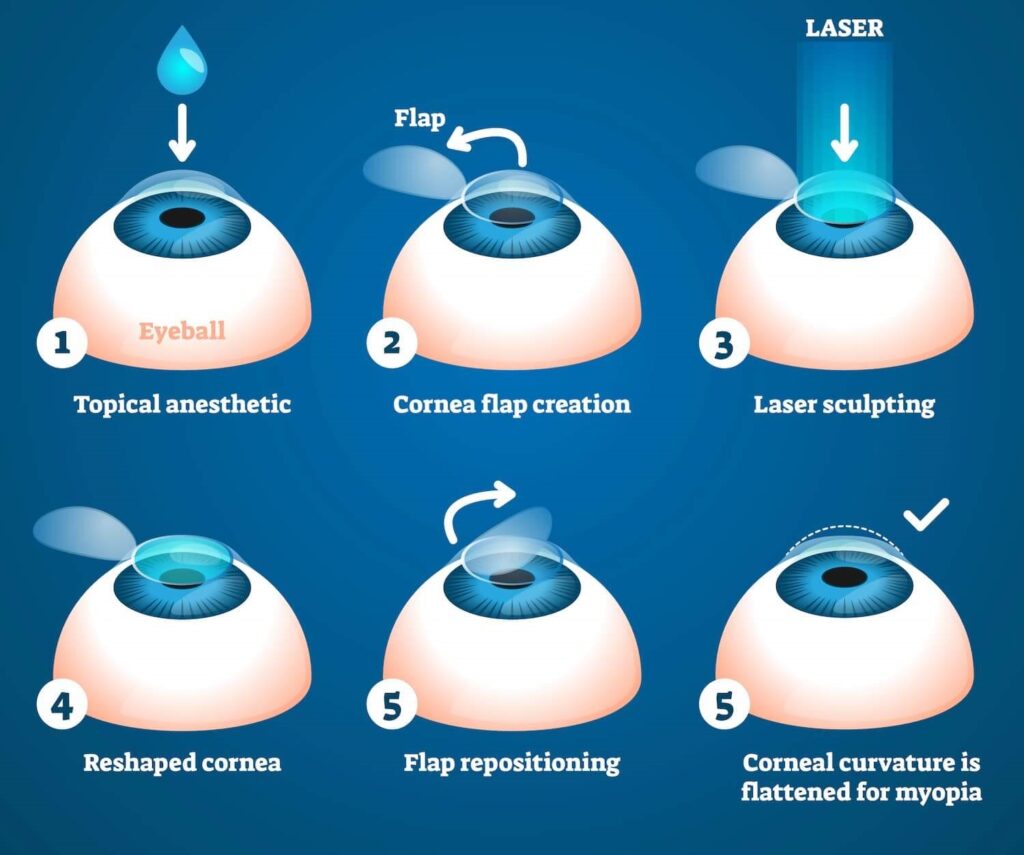
LASIK is a type of refractive surgery that aims to correct your natural refractive error. This type of laser vision correction can correct refractive errors like nearsightedness, farsightedness, and astigmatism.
During LASIK surgery, a laser is used to reshape the cornea, which is the clear front part of the eye, to improve the way that light is focused inside the eye. LASIK is typically performed as an outpatient procedure, meaning you get to go home the same day.
LASIK is a safe and effective procedure for many people, but it is not always the best choice method of laser vision correction for everyone. At Putnoi Eyecare, our LASIK surgeon, Dr. Ko, can help you determine whether LASIK is the right option for you based on your eyes and vision needs.

On the day of your LASIK procedure, you will need to have a family member or friend drive you to and from the procedure. Once you arrive, you will be prepped for your LASIK procedure.

First, your eyes will be numbed with eye drops, and a device called a lid speculum is used to gently hold your eyelids open during the procedure. Dr. Ko will make sure you are comfortable and begin the procedure.
Next, Dr. Ko will create a thin flap in the cornea using a special laser. At Putnoi Eyecare, Dr. Ko utilizes some of the most advanced LASIK technology available to ensure that you have optimal vision results.
Once the flap is created, Dr. Ko will fold the flap back temporarily to expose the underlying corneal tissue. Next, she will use a different laser to reshape your cornea by removing a small amount of tissue in a precise and controlled manner.
Once your cornea is reshaped, she will replace the flap on your surface cornea and position it to heal naturally. The flap will heal during your recovery without the need for stitches.
LASIK is a widely favored method for correcting vision. Opting for LASIK has several advantages, and here are some of the key ones:
The most obvious benefit of LASIK is improved vision without glasses or contact lenses. Most patients who undergo LASIK experience a significant improvement in their visual acuity, which can greatly enhance their quality of life.
The entire LASIK procedure often takes less than fifteen minutes to complete. Although you will need to be at the office longer, the actual procedure is typically quick and easy.
Most people experience improved vision immediately after the procedure, with minimal discomfort or downtime. Most can also return to work or their normal activities within a day or two after the surgery.
LASIK provides long-lasting results, with most patients experiencing improved vision for many years after the surgery. However, it is important to note that as people age, their eyesight can change, and additional procedures may be necessary to maintain optimal vision.
While LASIK is not covered by insurance, it can be a cost-effective solution for long-term vision correction compared to the ongoing costs of glasses or contact lenses.
Before you can schedule your LASIK procedure, you must first ensure that the procedure is right for you by determining whether or not you are a good candidate. In order to determine if you are a good candidate for LASIK, you will first need to schedule a LASIK evaluation at Putnoi Eyecare.
At this appointment, Dr. Ko will ask you about your vision goals and perform a comprehensive evaluation of your eyes to determine if LASIK may be a good option for you. Good candidates for LASIK surgery are typically adults over the age of eighteen who have stable vision. This means that your vision has remained stable for at least a year before the procedure. It is also important that you have healthy eyes free of any eye conditions such as glaucoma, cataracts, or severe dry eye syndrome.
Another important factor is having corneas with adequate thickness. Since a flap is created in your cornea during LASIK, your corneas must be thick enough to maintain the eye's structural integrity.
Hormonal changes during pregnancy or nursing can affect vision, so LASIK surgery is not recommended during this time. Lastly, it's important that you have realistic expectations.
It is essential that you have a clear understanding of what LASIK surgery can and cannot achieve and are willing to accept the potential risks and limitations of the procedure. Not everyone will be a good candidate for LASIK.
During your LASIK consultation, you will learn whether or not you are a good candidate for LASIK. Dr. Ko will discuss your vision correction options to help determine a plan that will accomplish your vision goals. If you are not a good candidate for LASIK, Dr. Ko may recommend an alternative procedure like PRK or clear lens exchange.

LASIK can correct certain types of vision problems but not all. LASIK can effectively correct refractive errors like nearsightedness, farsightedness, and astigmatism.
However, it may not be suitable for people with severe refractive errors or other eye conditions, such as cataracts, glaucoma, or keratoconus. It's also important to note that while LASIK can significantly reduce your dependence on visual aids and allow you to experience clear vision for many years, it will not prevent vision changes from other eye conditions. Cataracts, for example, are a common age-related eye condition. LASIK will not prevent you from developing cataracts or eliminate the symptoms caused by cataracts or any other eye condition.
LASIK has proven to be a safe and efficient method of vision correction and can allow you to enjoy life with greater visual freedom for many years to come.
Are you interested in learning if you may be a candidate for LASIK? Schedule a LASIK consultation at Putnoi Eyecare in Wellesley Hills, MA, today!